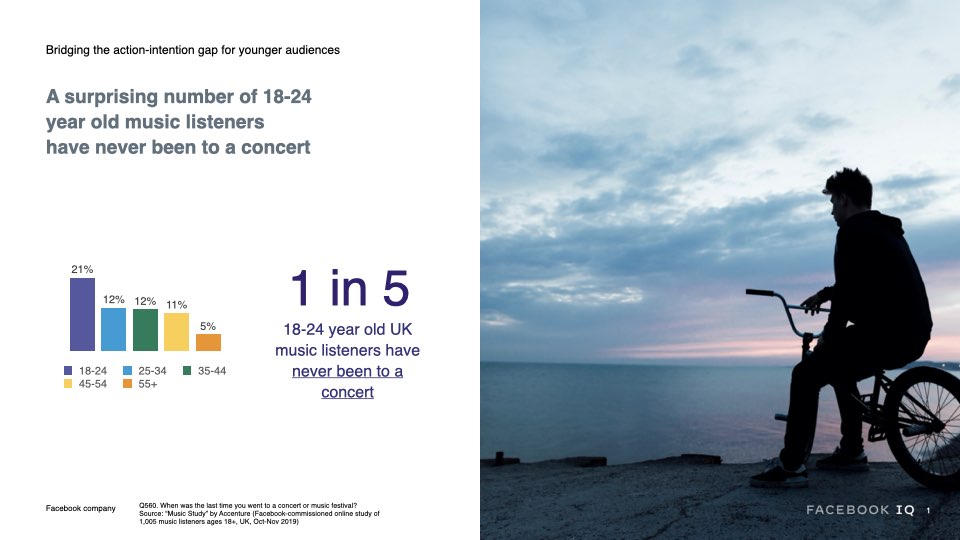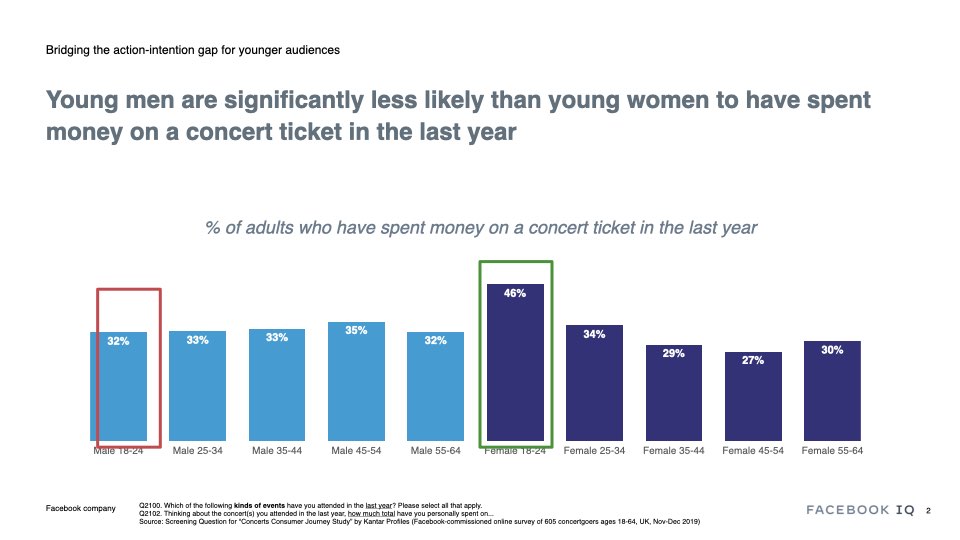Stuart Williams (MD, Music Week): To start, tell us about your role at Meta and your current focus.
Zehra Chatoo (head of connection planning, retail, Meta): “At Meta I work on insights and strategy, specifically on understanding audience behaviours and motivations.
We challenge what gets in the way of understanding audiences, work to remove blind spots and bias and represent audiences as they should be — empowering, not shrinking them. It’s both the right thing to do and it makes business sense too. Representative ads perform better, driving 69% better performance and 83% higher brand preference.”
Stuart: Music has never been less tribal. Listeners’ tastes have become extremely broad and streaming platforms have given people immediate access to all sorts of genres and artists. You can go from CKay to ABBA to Coldplay in eight minutes, love them all and nobody bats an eyelid. What does this mean for traditional audience stereotypes?
Zehra: “If ever there was a category that challenges stereotypes, it’s music.
That’s why discovery’s so important — providing opportunities for listeners to discover what they are most likely to love. It means going broader with targeting, unrestricting choices, reflecting how multifaceted we all are. Diversity is at the heart of discovery — trying to remove judgment, challenging stereotypes of what we may or may not like and encouraging a more inclusive approach to communicating with our audience.
James Kirkham, chief business officer at Defected, articulates this well:
‘In every way, diversity is important. As marketing gets more specific, the notion of targeting with outdated narrowness and blinkers only hinders your brand and performance. It reduces opportunity to find and nurture new fans and ultimately gives you a shorter shelf-life, speaking to an ever-decreasing pool.
At Defected we mirror an approach like that found on the dancefloor of any party we throw. It’s judgement-free, anything goes, and everyone is welcome. We don’t believe that people are merely a gender, age and location. They're multicultural, multi-dimensional, complex individuals with a variety of overlapping passions and interests. This leads to exciting ways to engage, inspire and share.
In our virtual festivals during the pandemic, this open attitude to targeting led to a huge multi-generational audience, an equal split of men and women engaged in over 130 countries, where age was not a barrier. This era of ubiquitous accessibility, leveraged on global social platforms, means we’re growing our community without just finding the few who look the same.’”

Stuart: How should music marketers approach targeting on different platforms?
Zehra: “First I’d say just because you can, that doesn’t mean you should! There are so many opportunities to over-target; avoid this, as it goes against an inclusive approach. You often see well thought-through audience segmentations, but with bias baked-in. Too often media is bought using over-simplified, outdated definitions. Look at the car industry. We tested a segmented approach to targeting supplied by an agency versus a broader approach on our platform, using machine learning to allow the targeting to go broader. This approach doubled the number of women exposed to the campaign. It reached 1.26m more users, a 69% increase for the same cost and +25.4% more test drive leads submitted by women. It’s a good example that highlights that bias (against targeting women) was within the segmented approach, reducing its potential.
We’ve seen similar insights on gaming, where globally people over 45 make up nearly a third of mobile gamers. The stereotypical 16-24 age group represents just 14% of mobile gamers. Women play more and more often: their sessions last 25% longer than men’s, and 43% of women play more than five times a week, compared to 38% for men. These audiences aren’t being communicated to or represented in advertising.

Back to music, Kantar research highlights that young men are significantly less likely than young women to have bought a concert ticket in the last year (32% versus 46%); that’s not reflected in the neat segmentation we’re handed on targeting audiences for concerts.
Olivia Hobbs, Music Week Women In Music Awards Entrepreneur of the Year 2021 and founder of Blackstar put it so well:
‘We advise partners and clients to take an unbiased approach to marketing plans, not to think in terms of stereotypes in music. Where the budget allows true discovery, we make sure audiences are as broad as possible so we can grow the reach and appeal for the artist and their campaign. We ensure those precious funds are invested as efficiently as possible. This creates your audience, not a preconceived notion based around loose interest patterns and presumption. People are unique after all; let’s treat them as such.’”
Stuart: We’re all human, so it’s inevitable that any marketer comes to a project with a degree of personal bias. That bias can be, at best, limiting, or, at worst, damaging to that potential reach. Practised well, digital marketing can remove much of that bias. What can marketers do to take an objective approach?
Zehra: “Be acutely aware of your own bias and plan with this in mind. Challenge your own bias and assumptions. Practically, be aware of narrow targeting bias — go broader. Second, be aware of language bias in the words you use. There’s a great tool called Textio that analyses language and assesses bias within it. At the agency I used to work at we used this tool on job specs and found that, unbeknown to us, there was male bias in the language we used on analytical roles, and we needed to course-correct. Third, test and learn with creative. Let the creative find your audience, not the other way around.
It’s incredibly easy to test creative on our platform and do so at scale. The advantages are enormous; an average 11x difference in the top and bottom performing creative. See which creative resonated with your audience more, test and adapt accordingly. Most importantly, build diverse teams that are representative of the world, that feel empowered and can use their voice to influence these hugely important decisions. Ideas don’t go wrong at the end, they go wrong at the beginning — those writing the briefs.”
Stuart: From a content perspective, what is the opportunity to work with creators in music marketing?
Zehra: “Creator marketing is huge — in 2020 people spent 121 billion minutes with the top 1000 creators’ videos. Two billion dollars in venture capital has been invested into Creator Economy start-ups since October 2020; the scale is undeniable. Beyond that, creators are able to represent the community authentically — they build deep connections with their followers and have a powerful insight into how brands should connect with their audience.
Our research highlights that trustworthy and authentic are the top two reasons for following a creator, and creator marketing now outperforms traditional advertising times two when it comes to being inspiring. What’s most interesting is that creator impact is highly linked to diversity. A third of consumers feel more connected on our platform with brands that are working with a diverse set of creators, 30% feel a brand that works with creators understands them and 34% say they discover more new brands as a result of seeing content posted by creators from a more diverse background. When only seven percent of the UK population feel represented in the advertising they see, the role of creators representing audiences couldn’t be more important.
As part of Black History Month, we created the Proud To Be creator hub as an inspirational resource for marketers to connect directly with Black creators and communities – diversifying their advertising and creating more meaningful connections. The Hub has been curated by Black-owned agencies and spotlights have been given to a diverse range of creators – providing insights into their communities on how best to connect with them. This is hugely important given insights from our BRIM framework highlights seven in 10 marketing professionals in the UK understand the need for fairer Black representation, but 42% of professionals have not made any decisions to increase Black representation in the past year.”
Stuart: What’s the one message you would want to leave readers with?
Zehra: “We all have bias, but challenge it and be representative of the real world. After all, diversity unlocks discovery, and discovery is central to growth.”











